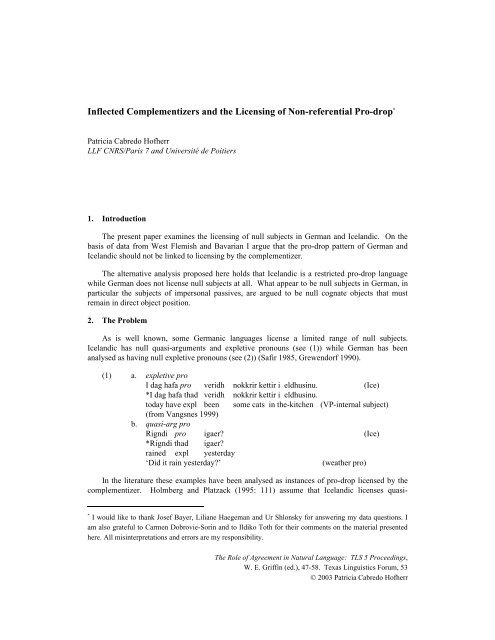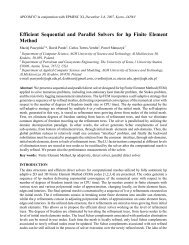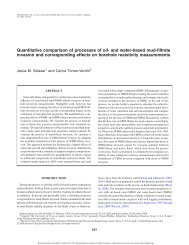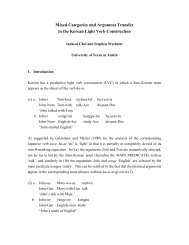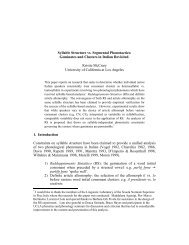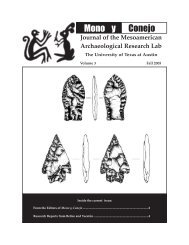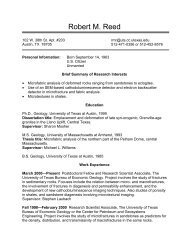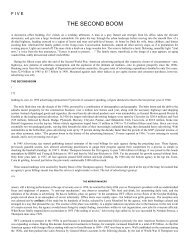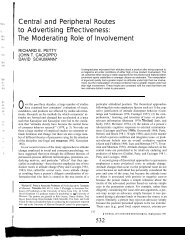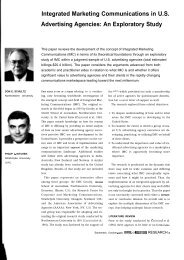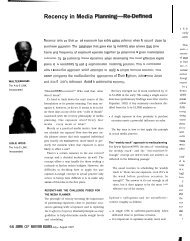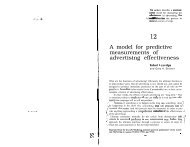The Role of Agreement in Natural Language
The Role of Agreement in Natural Language
The Role of Agreement in Natural Language
You also want an ePaper? Increase the reach of your titles
YUMPU automatically turns print PDFs into web optimized ePapers that Google loves.
Inflected Complementizers and the Licens<strong>in</strong>g <strong>of</strong> Non-referential Pro-drop *<br />
Patricia Cabredo H<strong>of</strong>herr<br />
LLF CNRS/Paris 7 and Université de Poitiers<br />
1. Introduction<br />
<strong>The</strong> present paper exam<strong>in</strong>es the licens<strong>in</strong>g <strong>of</strong> null subjects <strong>in</strong> German and Icelandic. On the<br />
basis <strong>of</strong> data from West Flemish and Bavarian I argue that the pro-drop pattern <strong>of</strong> German and<br />
Icelandic should not be l<strong>in</strong>ked to licens<strong>in</strong>g by the complementizer.<br />
<strong>The</strong> alternative analysis proposed here holds that Icelandic is a restricted pro-drop language<br />
while German does not license null subjects at all. What appear to be null subjects <strong>in</strong> German, <strong>in</strong><br />
particular the subjects <strong>of</strong> impersonal passives, are argued to be null cognate objects that must<br />
rema<strong>in</strong> <strong>in</strong> direct object position.<br />
2. <strong>The</strong> Problem<br />
As is well known, some Germanic languages license a limited range <strong>of</strong> null subjects.<br />
Icelandic has null quasi-arguments and expletive pronouns (see (1)) while German has been<br />
analysed as hav<strong>in</strong>g null expletive pronouns (see (2)) (Safir 1985, Grewendorf 1990).<br />
(1) a. expletive pro<br />
I dag hafa pro veridh nokkrir kettir i eldhus<strong>in</strong>u. (Ice)<br />
*I dag hafa thad veridh nokkrir kettir i eldhus<strong>in</strong>u.<br />
today have expl been some cats <strong>in</strong> the-kitchen (VP-<strong>in</strong>ternal subject)<br />
(from Vangsnes 1999)<br />
b. quasi-arg pro<br />
Rigndi pro igaer? (Ice)<br />
*Rigndi thad igaer?<br />
ra<strong>in</strong>ed expl yesterday<br />
‘Did it ra<strong>in</strong> yesterday?’ (weather pro)<br />
In the literature these examples have been analysed as <strong>in</strong>stances <strong>of</strong> pro-drop licensed by the<br />
complementizer. Holmberg and Platzack (1995: 111) assume that Icelandic licenses quasi-<br />
* I would like to thank Josef Bayer, Liliane Haegeman and Ur Shlonsky for answer<strong>in</strong>g my data questions. I<br />
am also grateful to Carmen Dobrovie-Sor<strong>in</strong> and to Ildiko Toth for their comments on the material presented<br />
here. All mis<strong>in</strong>terpretations and errors are my responsibility.<br />
<strong>The</strong> <strong>Role</strong> <strong>of</strong> <strong>Agreement</strong> <strong>in</strong> <strong>Natural</strong> <strong>Language</strong>: TLS 5 Proceed<strong>in</strong>gs,<br />
W. E. Griff<strong>in</strong> (ed.), 47-58. Texas L<strong>in</strong>guistics Forum, 53<br />
© 2003 Patricia Cabredo H<strong>of</strong>herr
48 PATRICIA CABREDO HOFHERR<br />
argumental pro s<strong>in</strong>ce the C° can identify the feature [number] while German can only license an<br />
expletive pro s<strong>in</strong>ce the C° has no feature content (cf., Card<strong>in</strong>aletti 1990 for German).<br />
(2) expletive pro<br />
a. weil [IP pro um sechs Uhr gegessen wurde]. (Ge)<br />
s<strong>in</strong>ce at six o’clock eaten was<br />
‘s<strong>in</strong>ce d<strong>in</strong>ner was at six o’clock.’ (impersonal passive)<br />
b. weil [IP pro [VP dem K<strong>in</strong>d e<strong>in</strong> Buch geschenkt wurde]]. (Ge)<br />
s<strong>in</strong>ce the child.dat a book.nom given was<br />
‘s<strong>in</strong>ce a book was given to the child.’ (VP-<strong>in</strong>ternal subject)<br />
(3) a. Icelandic: C identifies [number] ---> quasi-arg pro ok<br />
expletive pro ok<br />
b. German: C doesn’t identify [number] ---> quasi-arg pro *<br />
expletive pro ok<br />
This difference <strong>in</strong> feature-content on C° is then responsible for the contrast between German<br />
and Icelandic concern<strong>in</strong>g the subject <strong>of</strong> weather verbs, the prototypical quasi-argument:<br />
(4) a. *Rigndi pad igaer? (Ice)<br />
Rigndi igaer?<br />
ra<strong>in</strong>ed expl yesterday<br />
b. Regnete es gestern? (Ge)<br />
*Regnete gestern?<br />
ra<strong>in</strong>ed expl yesterday<br />
‘Did it ra<strong>in</strong> yesterday?’ (weather pro)<br />
Accord<strong>in</strong>g to this analysis, the partial pro-drop <strong>in</strong> Germanic is licensed by an <strong>in</strong>stance <strong>of</strong><br />
limited, abstract complementizer-agreement (C°-agreement). In what follows I will show that the<br />
data from two Germanic languages that display overt C°-agreement, namely Bavarian and West<br />
Flemish, do not support this analysis.<br />
3. C°-agreement and Non-referential Pro-drop <strong>in</strong> West Flemish and Bavarian<br />
West Flemish has referential null subjects licensed by C°-agreement. <strong>The</strong> paradigm <strong>of</strong> C°agreement<br />
dist<strong>in</strong>guishes all person/number-comb<strong>in</strong>ations (cf., Law 1991, Haegeman 1992).<br />
(5) a. K weten dan-k (ik) goan weggoan. C°+ 1sg (WFl)<br />
I know that-I I go leave<br />
‘I know that I am go<strong>in</strong>g to leave.’<br />
b. K weten da-j (gie) goat weggoan. C°+ 2sg<br />
c. K weten da-se (zie) goat weggoan. C°+ 3fsg<br />
d. K weten da-tje (jij) goat weggoan. C°+ 3msg<br />
e. K weten da-me (wunder) goan weggoan. C°+ 1pl<br />
f. K weten da-j (gunder) goat weggoan. C°+ 2pl<br />
g. K weten dan-ze (zunder) goan weggoan. C°+ 3pl<br />
h. K weten da Jan goat weggoan. C°+ NPsg (Jan)<br />
i. K weten dan Jan en Pol goan weggoan. C°+ NPpl (Jan en Pol)<br />
(from Law 1991: 254, cit<strong>in</strong>g Haegeman 1992)
AGREEMENT IN PRENOMINAL POSSESSIVES 49<br />
Quasi-arguments and expletives cannot be null however: the subjects <strong>of</strong> weather verbs,<br />
extrapositions and impersonal passives have to be lexical (L. Haegeman, p.c.):<br />
(6) a. K weten dat et regent (WFl)<br />
*K weten dat regent<br />
I know that expl ra<strong>in</strong>s<br />
‘I know that it ra<strong>in</strong>s.’ (weather verb)<br />
b. K weten dat et moeilijk is vur en appartement te v<strong>in</strong>den. (WFl)<br />
*K weten dat moeilijk is vur en appartement te v<strong>in</strong>den.<br />
I know that expl difficult is for an appartement to f<strong>in</strong>d<br />
‘I know that it’s difficult to f<strong>in</strong>d an appartment.’ (extraposition)<br />
c. K weten dat er gedanst is. (WFl)<br />
*K weten dat gedanst is.<br />
I know that expl danced is<br />
‘I know that there was danced.’ (impersonal passive)<br />
Bavarian also licenses referential null subjects by <strong>in</strong>flection on the complementizer; the<br />
<strong>in</strong>flectional paradigm on the C° is more restricted than <strong>in</strong> West Flemish, however: only the 2 nd<br />
person sg/pl pronouns can be null (Bayer 1984).<br />
(7) wenn-st pro kummst. (Bav)<br />
when.2sg come.2sg<br />
‘when you.sg come’<br />
(from Bayer 1984: 31)<br />
Aga<strong>in</strong>, like <strong>in</strong> West Flemish, C° <strong>in</strong> Bavarian does not license null subjects for weather-verbs<br />
(J. Bayer, p.c.):<br />
(8) Da Hans beibt dahoam wei ‘s regnet (Bav)<br />
*Da Hans beibt dahoam wei regnet<br />
det Hans stays at-home because expl ra<strong>in</strong>s<br />
‘Hans stays at home because it ra<strong>in</strong>s.’ (weather verb)<br />
Bavarian contrasts with West Flemish with respect to the impersonal passive: <strong>in</strong> Bavarian a<br />
lexical expletive is impossible with this construction (compare with (6c)).<br />
(9) Heid schlaffa olle a so lang (Bav)<br />
today sleep all so long<br />
wei (*’s) gestan bis <strong>in</strong>’d Fruah g’feiat woan is<br />
because expl yesterday until the early morn<strong>in</strong>g partied been is<br />
‘Today everyone is sleep<strong>in</strong>g so long because the party went on till late at night.’<br />
(impersonal passive)<br />
<strong>The</strong> data from West Flemish and Bavarian can be summarised as follows:<br />
(10) a. <strong>The</strong> West Flemish and Bavarian paradigms <strong>of</strong> overt C°-agreement do not license<br />
quasi-argumental pro.<br />
b. <strong>The</strong> richness <strong>of</strong> the overt C°-agreement is not correlated with the possibility <strong>of</strong><br />
hav<strong>in</strong>g an empty expletive subject.
50 PATRICIA CABREDO HOFHERR<br />
With respect to expletives, West Flemish behaves like Dutch <strong>in</strong> requir<strong>in</strong>g an overt subject er,<br />
‘there’, with impersonal passives and an overt et, ‘it’, for weather-verbs. In Bavarian the C°agreement<br />
is less dist<strong>in</strong>ctive than <strong>in</strong> West Flemish; nevertheless Bavarian permits a null subject <strong>in</strong><br />
impersonal passives just like Standard German. S<strong>in</strong>ce Dutch and Standard German do not have<br />
any overt C°-agreement the fact that West Flemish and Bavarian behave like Dutch and Standard<br />
German respectively suggests that the decisive factor <strong>in</strong> licens<strong>in</strong>g the empty subject <strong>in</strong> Bavarian<br />
and German is <strong>in</strong>dependent <strong>of</strong> C°-agreement.<br />
4. <strong>The</strong> Analysis<br />
<strong>The</strong> West Flemish and Bavarian data show that the paradigms <strong>of</strong> overt C°-agreement do not<br />
license quasi-argumental pro (weather pro, e.g.). It therefore seems implausible to assume that<br />
abstract <strong>in</strong>flection on C° should license quasi-argumental pro <strong>in</strong> Icelandic.<br />
In what follows I first motivate a modification <strong>of</strong> Rizzi’s theory <strong>of</strong> pro-drop: I show that the<br />
content identification <strong>of</strong> null pronouns has to be related to its referential status, not to the type <strong>of</strong><br />
th-role. I then propose an alternative account <strong>of</strong> the contrast between Icelandic and German with<br />
respect to null subjects. F<strong>in</strong>ally, I present some evidence that the behaviour <strong>of</strong> C°-agreement is an<br />
<strong>in</strong>stance <strong>of</strong> a more general phenomenon, namely that given non-f<strong>in</strong>ite licens<strong>in</strong>g categories<br />
referential null pronouns are less marked than their quasi-argumental and expletive counterparts.<br />
4.1 Licens<strong>in</strong>g <strong>of</strong> Pro-drop<br />
S<strong>in</strong>ce Rizzi (1986), it has been generally accepted that null pronouns are subject to two<br />
separate licens<strong>in</strong>g requirements:<br />
(11) a. formal licens<strong>in</strong>g: pro is governed by X^°y<br />
(where X° is a govern<strong>in</strong>g head <strong>of</strong> type y) (Rizzi’s (40), 1986: 519).<br />
b. content identification: Let X be the licens<strong>in</strong>g head <strong>of</strong> an occurrence <strong>of</strong> pro:<br />
then pro has the grammatical specification <strong>of</strong> the features on X co<strong>in</strong>dexed with<br />
it (Rizzi’s (41), 1986: 520).<br />
More specifically, Rizzi (1986: 543) proposes the follow<strong>in</strong>g conditions for the identification<br />
<strong>of</strong> the content <strong>of</strong> empty categories.<br />
(12) Content identification (Rizzi 1986):<br />
a. referential : identify the feature [person]<br />
b. quasi-arguments : identify the feature [number]<br />
c. expletives : no features need to be identified<br />
This typology implies a hierarchy <strong>of</strong> empty categories accord<strong>in</strong>g to which any language<br />
capable <strong>of</strong> identify<strong>in</strong>g referential null subjects should also admit quasi-argumental and expletive<br />
pro-drop. <strong>The</strong> content identification <strong>in</strong> (12) is based on the assumption that null pronouns will<br />
pattern together depend<strong>in</strong>g on the type <strong>of</strong> th-role assigned to them (a full th-role, a quasi-th-role,<br />
no th-role), so that Rizzi’s systeme implies the follow<strong>in</strong>g hierarchy:<br />
(13) Pro-drop hierarchy: referential pro ---> quasi-argumental pro ---> expletive pro<br />
(full th-role) (quasi-th-role) (no th-role)
AGREEMENT IN PRENOMINAL POSSESSIVES 51<br />
<strong>The</strong> pro-drop patterns <strong>of</strong> partial pro-drop languages like F<strong>in</strong>nish and Modern Hebrew show,<br />
however, that the possiblity <strong>of</strong> hav<strong>in</strong>g a null pronoun is not a function <strong>of</strong> the th-role assigned to the<br />
pronouns.<br />
As discussed <strong>in</strong> Holmberg and Nikanne (1994), F<strong>in</strong>nish 1 st and 2 nd person pronouns can be<br />
dropped, while 3 rd person pronouns have to be lexical: (For different analyses <strong>of</strong> the contrast<br />
between 1 st /2 nd and 3 rd person pronouns see e.g., Holmberg and Nikanne (1994, to appear),<br />
Shlonsky (1997)).<br />
(14) a. (M<strong>in</strong>ä) ost<strong>in</strong> kirjan. (Fi)<br />
I bought-1sg book<br />
b. (S<strong>in</strong>ä) ost<strong>in</strong> kirjan.<br />
you.sg bought-2sg book<br />
c. *(Hän) ost<strong>in</strong> kirjan.<br />
(s)he bought-3sg book<br />
d. (Me) ostimme kirjan.<br />
We bought-1pl book<br />
e. (Te) ostitte kirjan.<br />
you.pl bought-2pl book<br />
f. *(He) ostivat kirjan.<br />
they bought-3pl book<br />
(from Holmberg and Nikanne 1994)<br />
I want to focus on the behaviour <strong>of</strong> arbitrarily <strong>in</strong>terpreted pronom<strong>in</strong>als. <strong>The</strong> arbitrary pronoun<br />
takes 3 rd person morphology but does not pattern with the referential 3 rd person pronouns. In fact,<br />
arbitrary pronom<strong>in</strong>als—which bear a full th-role—are null:<br />
(15) Metsästä löytää helposti mustikoita (Fi)<br />
forest-elative f<strong>in</strong>d.3sg easily blueberries-partitive<br />
‘One f<strong>in</strong>ds blueberries easily <strong>in</strong> the forest.’<br />
(from Va<strong>in</strong>ikka and Levy 1999)<br />
This particular pattern<strong>in</strong>g <strong>of</strong> arbitrary pronom<strong>in</strong>als can also be found <strong>in</strong> Modern Hebrew.<br />
Modern Hebrew allows pro-drop for the 1 st and 2 nd person pronouns, but referential pro-drop is<br />
limited to the future and <strong>in</strong> the past tense (c.f., Borer 1980, 1986, 1989, Shlonsky, 1997).<br />
(16) ti-xtov (MH)<br />
2m.sg/3f.sg will-write<br />
‘You-ms will write.’<br />
*‘She will write.’<br />
(from Shlonsky 1997)<br />
(17) arbitrary pro +present:<br />
moxrim Sam kartisim. (MH)<br />
sell[benoni]-3m.pl there tickets<br />
‘<strong>The</strong>y(arb) sell tickets there.’ (arb pro)<br />
(from Shlonsky 1997)
52 PATRICIA CABREDO HOFHERR<br />
Modern Hebrew shows particularly clearly that arbitrary null pronom<strong>in</strong>als do not pattern with<br />
the fully referential personal pronouns: although the present tense does not license 1/2/3 person<br />
pro-drop, arbitrary null pronom<strong>in</strong>als are allowed as <strong>in</strong> (17) above.<br />
In both F<strong>in</strong>nish and Modern Hebrew the subject <strong>of</strong> weather verbs—the prototypical quasiargument—is<br />
also null:<br />
(18) atmospheric pro:<br />
a. (Se) sataa. (Fi)<br />
it ra<strong>in</strong>s<br />
(ex 1b., H&N))<br />
b. kar (MH)<br />
(it is) cold<br />
(from Shlonsky 1997)<br />
<strong>The</strong> distribution <strong>of</strong> arbitrary null pronom<strong>in</strong>als <strong>in</strong> F<strong>in</strong>nish and Modern Hebrew suggests that<br />
the availability <strong>of</strong> null subjects depends on the referential status <strong>of</strong> the pronouns: arbitrary null<br />
pronom<strong>in</strong>als carry a full th-role, but they resemble weather-subjects <strong>in</strong> that they are not fully<br />
referential. Follow<strong>in</strong>g Shlonsky (1997), I will refer to null arbitrary pronom<strong>in</strong>als and null subjects<br />
<strong>of</strong> weather predicates as quasi-referential pro-drop. I further want to suggest, that the subjects <strong>of</strong><br />
weather-verbs and arbitrary pronom<strong>in</strong>als pattern together:<br />
(19) If the subjects <strong>of</strong> weather-verbs are null then arbitrary null subjects are licensed, too.<br />
4.2. <strong>The</strong> Contrast between Icelandic and German<br />
Given this modified typology <strong>of</strong> null subjects, I propose that the contrast between Icelandic<br />
and German can be accounted for by the follow<strong>in</strong>g assumptions: (i) Icelandic allows quasireferential<br />
null subjects, and (ii) German does not allow null subjects at all. This analysis implies<br />
<strong>in</strong> particular that there cannot be any null expletive subjects <strong>in</strong> German.<br />
4.2.1 Expletive pro<br />
Reject<strong>in</strong>g the existence <strong>of</strong> null expletive subjects <strong>in</strong> German might seem contradictory with<br />
the fact that <strong>in</strong> German NP subjects may occupy several syntactic positions. In particular with<br />
werden-passives the nom<strong>in</strong>ative NP may stay <strong>in</strong> a VP-<strong>in</strong>ternal position. <strong>The</strong> possibility <strong>of</strong> hav<strong>in</strong>g<br />
multiple positions for the subject-NP and the existence <strong>of</strong> an expletive pro are not directly l<strong>in</strong>ked,<br />
however. <strong>The</strong> l<strong>in</strong>k between the two properties requires several additional assumptions:<br />
(20) (i) Nom<strong>in</strong>ative assignment and expletive cha<strong>in</strong>s:<br />
<strong>The</strong>re is a designated subject position (spec IP) that receives nom<strong>in</strong>ative case.<br />
Subject NPs <strong>in</strong> a position other than spec IP have to form an expletive-associate<br />
cha<strong>in</strong> with an expletive <strong>in</strong> spec IP (to receive case).<br />
If there is no visible expletive, the expletive-associate cha<strong>in</strong> is formed with a<br />
null expletive.<br />
(ii) EPP: Spec IP must be filled.
AGREEMENT IN PRENOMINAL POSSESSIVES 53<br />
S<strong>in</strong>ce I reject the existence <strong>of</strong> expletive pro, I cannot assume that nom<strong>in</strong>ative assignment<br />
proceeds via expletive-associate cha<strong>in</strong>s. Follow<strong>in</strong>g Borer (1986) I will assume that nom<strong>in</strong>ative<br />
assignment is due to a co-<strong>in</strong>dexation relation between the <strong>in</strong>flection and the nom<strong>in</strong>ative subject.<br />
This then implies that subjects <strong>in</strong> non-canonical positions need not enter <strong>in</strong>to an expletive cha<strong>in</strong><br />
for case reasons.<br />
Once expletive-associate cha<strong>in</strong>s are set aside, only the EPP forces the existence <strong>of</strong> an empty<br />
expletive. Several authors have proposed that the EPP does not necessarily require the fill<strong>in</strong>g <strong>of</strong><br />
the designated subject position (Nash and Rouveret 1996, Speas 1995). I will follow essentially a<br />
proposal <strong>in</strong> Holmberg and Platzack (1995), and assume that the EPP-requirement can be met <strong>in</strong><br />
two ways: (i) either by <strong>in</strong>sertion <strong>of</strong> a lexical expletive <strong>in</strong> the designated subject position, or (ii) by<br />
V-movement to I°.<br />
If there are no null subjects <strong>in</strong> German, we need an alternative account for the German<br />
example (2a) that has no surface subject. Follow<strong>in</strong>g Dobrovie-Sor<strong>in</strong> (1986, 1998) I assume that<br />
the passivisation <strong>of</strong> <strong>in</strong>transitives relies on the projection <strong>of</strong> a null cognate object.<br />
(21) [CP Hier wird [IP [VP cog gebaut. ]]] (Ge)<br />
here werden.3sg built<br />
‘Here is built. = Here there is build<strong>in</strong>g go<strong>in</strong>g on.’<br />
<strong>The</strong> null <strong>in</strong>ner object cog is licensed <strong>in</strong> its base position <strong>in</strong> the impersonal passive (see (22a.)),<br />
<strong>in</strong> parallel with the lexical subject <strong>of</strong> a werden-passive (22b).<br />
(22) a. [CP Hier wird [ IP [ VP cog gebaut. ]]] (Ge)<br />
b. [CP Hier wird [ IP [ VP e<strong>in</strong> Haus gebaut. ]]]<br />
here wird a house built<br />
Under this analysis an impersonal passive always appears <strong>in</strong> a construction licens<strong>in</strong>g a VP<strong>in</strong>ternal<br />
subject. When an expletive appears it is not the subject <strong>of</strong> the impersonal passive: its<br />
appearance is conditioned by the syntax <strong>of</strong> constructions with a VP-<strong>in</strong>ternal subject.<br />
This analysis then <strong>in</strong>tegrates the generalisation <strong>of</strong> Vikner (1995) stat<strong>in</strong>g that languages that<br />
allow impersonal passives also allow personal passives with VP-<strong>in</strong>ternal subjects (Vikner’s<br />
impersonal passive transitives). In languages where the spec IP position is necessarily filled,<br />
impersonal passives and VP-<strong>in</strong>ternal subjects <strong>of</strong> passives should appear with the same expletive.<br />
<strong>The</strong> Ma<strong>in</strong>land Scand<strong>in</strong>avian languages (illustrated here by Danish) confirm this expectation:<br />
(23) a. ... at der blev spist et aeble (Da)<br />
that expl was eaten an apple<br />
‘... that there was eaten an apple.’<br />
b. ... at der er blevet danset<br />
that expl is been danced<br />
‘... that there was danc<strong>in</strong>g go<strong>in</strong>g on.’<br />
(from Vikner 1995)<br />
c. [CP [C’ at [ IP der [ I’ [ VP V et aeble ]]]]] (see (23a))<br />
[CP [C’ at [ IP der [ I’ [ VP V cog ]]]]] (see (23b))
54 PATRICIA CABREDO HOFHERR<br />
In Icelandic a personal passive with the nom<strong>in</strong>ative NP <strong>in</strong> object position does not allow a<br />
lexical expletive <strong>in</strong> spec IP. Correlatively the impersonal passive — which I claim to be an<br />
<strong>in</strong>stance <strong>of</strong> the same construction — does not have a lexical expletive <strong>in</strong> spec IP.<br />
(24) a. Igaer var bordhadh epli (Ice)<br />
yesterday was eaten an apple<br />
‘Yesterday was eaten an apple.’<br />
b. Igaer hefur veridh dansadh<br />
yesterday is been danced<br />
‘Yesterday was danc<strong>in</strong>g go<strong>in</strong>g on.’<br />
(adapted from Vikner, 1995)<br />
c. [CP Igaer [ C’ [ IP [ I’ [ VP V epli ]]]]] (see (24a))<br />
[CP Igaer [ C’ [ IP [ I’ [ VP V cog ]]]]] (see (24b))<br />
Vikner analyses impersonal passives as hav<strong>in</strong>g an expletive associate-cha<strong>in</strong> between the<br />
expletive and the passive morpheme. Notice that this analysis supposes a difference between<br />
personal and impersonal passives: while <strong>in</strong> impersonal passives like (23a) the expletive forms a<br />
cha<strong>in</strong> with the passive morphology and thereby with the external argument, the personal passive <strong>in</strong><br />
(23b) relies on a cha<strong>in</strong> between the expletive and the <strong>in</strong>ternal argument <strong>of</strong> the underly<strong>in</strong>g verb.<br />
<strong>The</strong> present analysis differs from Vikner’s proposal <strong>in</strong> several ways.<br />
First, the two proposals presuppose different analyses <strong>of</strong> passivisation. Vikner follows<br />
Jaeggli (1986), Baker, Johnson and Roberts (1989) <strong>in</strong> assum<strong>in</strong>g that the passive morpheme<br />
realises the external th-role. Under this type <strong>of</strong> analysis the unify<strong>in</strong>g feature <strong>of</strong> personal and<br />
impersonal passivisation is the absorption <strong>of</strong> the external th-role by the passive morphology, or <strong>in</strong><br />
more theory-neutral terms, the demotion <strong>of</strong> the subject. <strong>The</strong> analysis proposed here does not<br />
assume that the external th-role <strong>of</strong> the passivised verb is realised <strong>in</strong> the syntax. <strong>The</strong> unify<strong>in</strong>g<br />
feature <strong>of</strong> personal and impersonal passivisation is taken to be the promotion <strong>of</strong> the underly<strong>in</strong>g<br />
object (Perlmutter and Postal 1977, Dobrovie-Sor<strong>in</strong> 1986). Secondly, unlike Vikner’s analysis,<br />
the present analysis does not assume expletive-associate cha<strong>in</strong>s. Thirdly, accord<strong>in</strong>g to the analysis<br />
proposed here the examples (23a) and (23b) are taken to be completely parallel: <strong>in</strong> both structures<br />
the promoted object <strong>of</strong> the passive is realised <strong>in</strong> VP-<strong>in</strong>ternal position, while the expletive (if it<br />
appears) fills the spec IP position for <strong>in</strong>dependent reasons.<br />
4.2.2 Atmospheric pro<br />
Under the proposed analysis the null subjects <strong>of</strong> weather verbs <strong>in</strong> Icelandic are a case <strong>of</strong><br />
quasi-referential pro-drop:<br />
(25) Rigndi pro igaer? (Ice)<br />
ra<strong>in</strong>ed yesterday<br />
‘Did it ra<strong>in</strong> yesterday?’ (weather pro)<br />
In section 4.1. I have argued that quasi-argumental pro and arbitrary pronouns pattern<br />
together. <strong>The</strong> analysis <strong>of</strong> Icelandic as a quasi-referental pro-drop language is therefore supported<br />
by the fact that Icelandic also satisfies (19) allow<strong>in</strong>g arbitrary subjects:
AGREEMENT IN PRENOMINAL POSSESSIVES 55<br />
(26) arbitrary pro:<br />
a. Var <strong>of</strong>t komidh se<strong>in</strong>t heimm. (Ice)<br />
Was <strong>of</strong>ten come late home.<br />
‘People/we (etc) <strong>of</strong>ten came home late.’<br />
b. ’Eg vissi ekki adh aetti adh fara svona <strong>of</strong>t til Graenland. (Ice)<br />
I knew not that should to go so <strong>of</strong>ten to Greenland.<br />
‘I did not know that one should go so <strong>of</strong>ten to Greenland.’<br />
(exs (3) and (27a) from Sigurdhsson 1990)<br />
4.2.3 Summary<br />
I have proposed an analysis <strong>of</strong> German null subjects that does not assume empty expletives:<br />
impersonal passives are analysed as hav<strong>in</strong>g empty VP-<strong>in</strong>ternal subjects correspond<strong>in</strong>g to the<br />
cognate object <strong>of</strong> the underly<strong>in</strong>g verb. <strong>The</strong> assumption underly<strong>in</strong>g this analysis is that the<br />
possiblity <strong>of</strong> project<strong>in</strong>g an object position is common to all unergative verbs (c.f., dummy<br />
reflexives <strong>in</strong> English resultatives He drank himself silly, cognate objects He lives the life <strong>of</strong> Riley).<br />
<strong>The</strong> compatibility <strong>of</strong> unergative verbs with a transitive structure is <strong>in</strong>dependent <strong>of</strong> the possibility<br />
<strong>of</strong> hav<strong>in</strong>g null subjects (c.f., English).<br />
Accord<strong>in</strong>g to the analysis presented here German allows superficially subjectless<br />
constructions s<strong>in</strong>ce the direct object NP <strong>in</strong> werden-passives can be assigned nom<strong>in</strong>ative <strong>in</strong> VP<strong>in</strong>ternal<br />
position. So under a conjunction <strong>of</strong> particular circumstances, the null cognate object —<br />
that I take to be available crossl<strong>in</strong>guistically — can function as the nom<strong>in</strong>ative subject <strong>of</strong> the<br />
clause. Under the analysis proposed here, German is not a null subject language s<strong>in</strong>ce it does not<br />
allow null external arguments. Accord<strong>in</strong>g to the present analysis a language that allows null<br />
external arguments allows at least quasi-referential null subjects.<br />
If this is correct, there are three types <strong>of</strong> languages:<br />
(27) a. <strong>Language</strong>s <strong>in</strong> which the designated subject position has to be filled (EPP)<br />
(e.g., Ma<strong>in</strong>land Scand<strong>in</strong>avian).<br />
b. <strong>Language</strong>s <strong>in</strong> which the designated subject position does not have to be filled<br />
(no EPP/EPP satisfied by other means). Here two cases are possible:<br />
(b.i) <strong>Language</strong>s <strong>in</strong> which the lexical subject has access to several syntactic<br />
positions (e.g., German).<br />
(b.ii) <strong>Language</strong>s <strong>in</strong> which allow null subjects to vary<strong>in</strong>g degrees (e.g.,<br />
Icelandic (quasi-referential pro-drop), F<strong>in</strong>nish (partial pro-drop),<br />
Spanish (full pro-drop)).<br />
Notice that <strong>in</strong> analyses that recognize an empty expletive, the types b.i. and b.ii. <strong>of</strong> the above<br />
typology are collapsed.<br />
4.3 Licens<strong>in</strong>g <strong>of</strong> pro-drop by a Non-f<strong>in</strong>ite Category<br />
We have seen <strong>in</strong> West Flemish and Bavarian that given an <strong>in</strong>flected C° the licens<strong>in</strong>g <strong>of</strong><br />
referential null pronouns does not imply the licens<strong>in</strong>g <strong>of</strong> expletive or quasi-referential null<br />
pronouns (go<strong>in</strong>g aga<strong>in</strong>st the pro-hierarchy <strong>in</strong> Rizzi 1986). This seems to be part <strong>of</strong> a more general<br />
phenomenon:
56 PATRICIA CABREDO HOFHERR<br />
(28) <strong>The</strong> licens<strong>in</strong>g <strong>of</strong> non-referential null pronouns by non-f<strong>in</strong>ite categories (i.e., other<br />
than the f<strong>in</strong>ite verb) is more restricted than pro-drop licensed by the f<strong>in</strong>ite verb.<br />
<strong>The</strong> data from West Flemish and Bavarian presented above po<strong>in</strong>t to this conclusion and <strong>in</strong> the<br />
next section I will present further evidence from Modern Hebrew.<br />
4.3.1 Modern Hebrew<br />
<strong>The</strong> Modern Hebrew <strong>in</strong>flected negation particle also displays restrictions on non-referential<br />
null subjects (Shlonsky 1997). As the follow<strong>in</strong>g example illustrates, the <strong>in</strong>flected negation particle<br />
?eyn is compatible with referential null pronouns <strong>of</strong> the 1 st and 2 nd person:<br />
(29) ?eyn -(en)i/ -xa/ -ex/ -enu kotev/et/im sipurim. (MH)<br />
neg-1sg /2msg/2fsg/1pl write(benoni)-m.sg/f.sg/pl stories<br />
‘I/you.m/you.f/we do not write stories.’<br />
(from Shlonsky 1997))<br />
<strong>The</strong> third person cannot be dropped even though the agreement on the particle is<br />
unambiguously 3msg:<br />
(30) * ?eyn -o kotev sipurim. (MH)<br />
neg 3m.sg write(benoni)-m.sg stories<br />
‘He doesn’t write stories.’<br />
(from Shlonsky 1997)<br />
Given that for the 1 st and 2 nd person null pronouns are possible, a null pronoun must be<br />
formally licensed <strong>in</strong> configurations with ?eyn. Even though formal licens<strong>in</strong>g is available, however,<br />
the nom<strong>in</strong>al <strong>in</strong>flection on the negation particle ?eyn cannot be expletive or quasi-referential<br />
(Shlonsky 1997: 140ff):<br />
(31) Inflected ?eyn: (MH)<br />
a. * ?eyn -an mitxolelot kan sufot.<br />
neg-3fpl occur(benoni).fplhere storms<br />
‘Storms don’t occur here.’ (DP-expletive)<br />
b. * ?eyn -o kaSe li-lmod polanit.<br />
neg 3msg difficult to-learn Polish<br />
‘It isn’t difficult to learn Polish.’ (CP-expletive)<br />
c. * ?eyn -am d<strong>of</strong>kim ba-delet.<br />
neg 3mpl knock(benoni).mpl on-the door<br />
‘ No one is knock<strong>in</strong>g on the door.’ (existential arb pro)<br />
d. * ?eyn -am ma?arixim ?et ha-truma Sela.<br />
neg-3mpl value(benoni).mpl acc the-contribution her<br />
People don’t value her contribution.’ (universal arb pro)<br />
e. * ?eyn -o kar.<br />
neg-3mg cold<br />
‘It isn’t cold.’ (atmospheric pro)<br />
(from Shlonsky 1997)
AGREEMENT IN PRENOMINAL POSSESSIVES 57<br />
<strong>The</strong> negative particle <strong>in</strong> Modern Hebrew therefore furnishes an additional example <strong>of</strong> a prodrop<br />
pattern licensed by a non-f<strong>in</strong>ite category where expletive and quasi-argumental pro-drop<br />
more marked than quasi-referential pro-drop.<br />
4.3.2 F<strong>in</strong>iteness and Non-referential pro-drop<br />
If the present <strong>in</strong>terpretation <strong>of</strong> the Modern Hebrew data turns out to be correct, then Modern<br />
Hebrew provides another <strong>in</strong>stance <strong>of</strong> the generalization <strong>in</strong> (28). This would then suggest that the<br />
two licens<strong>in</strong>g conditions proposed by Rizzi are not sufficient to account for the distribution <strong>of</strong><br />
referential and quasi-referential pro-drop. In particular, f<strong>in</strong>iteness might have a role to play <strong>in</strong> the<br />
account <strong>of</strong> the licens<strong>in</strong>g <strong>of</strong> quasi-referential pro-drop.<br />
5. Conclusion<br />
I have presented data from West Flemish and Bavarian that show that overt C°-agreement<br />
does not license non-referential pro-drop. Consequently, I have argued that the null subjects <strong>in</strong><br />
German and Icelandic should not be analysed as <strong>in</strong>stances <strong>of</strong> pro-drop licensed by abstract C°agreement.<br />
Under the alternative analysis proposed here Icelandic allows quasi-referential (but<br />
not expletive) pro-drop. <strong>The</strong> null subjects <strong>in</strong> impersonal passives <strong>in</strong> Icelandic as well as <strong>in</strong><br />
German result from two factors (i) unergative verbs project a direct object position when <strong>in</strong><br />
comb<strong>in</strong>ation with passive morphology, and (ii) the null cognate object can be assigned nom<strong>in</strong>ative<br />
VP-<strong>in</strong>ternally. F<strong>in</strong>ally, I have presented another construction where given a non-f<strong>in</strong>ite licensor the<br />
non-referential null subjects do not seem to be the unmarked case. This evidence has led me to the<br />
conclusion that f<strong>in</strong>iteness might be crucial <strong>in</strong> licens<strong>in</strong>g non-referential pro-drop.<br />
References<br />
Baker, M., K. Johnson and I. Roberts. (1989). Passive Arguments Raised. L<strong>in</strong>guistic Inquiry 20,<br />
219-252.<br />
Bayer, J. (1984). Towards an Explanation <strong>of</strong> Certa<strong>in</strong> That-t Phenomena: <strong>The</strong> COMP-node <strong>in</strong><br />
Bavarian. In W. de Geest and Y. Putseys (eds.), Sentential Complementation, 23-32.<br />
Dordrecht: Foris.<br />
Borer, H. (1980). Empty Subjects <strong>in</strong> Modern Hebrew and Constra<strong>in</strong>ts on <strong>The</strong>matic Relations. In<br />
Proceed<strong>in</strong>gs <strong>of</strong> NELS 10, 25-37. University <strong>of</strong> Ottawa.<br />
Borer, H. (1986). I-Subjects. L<strong>in</strong>guistic Inquiry 17, 375-416.<br />
Borer, H. (1989). Anaphoric AGR. In O. Jaeggli and K. Safir (eds.), <strong>The</strong> Null Subject Parameter,<br />
69-109. Dordrecht: Kluwer.<br />
Card<strong>in</strong>aletti, A. (1990). Impersonal Constructions and Sentential Arguments <strong>in</strong> German. Padova:<br />
Unipress.<br />
Dobrovie-Sor<strong>in</strong>, C. (1986). A Propos du Contraste Entre le Passif Morphologique et se "moyen"<br />
dans les tours Impersonnels. L<strong>in</strong>gvisticae Investigationes 10, 289-330.<br />
Dobrovie-Sor<strong>in</strong>, C. (1998). Impersonal si Constructions <strong>in</strong> Romance and the Passivisation <strong>of</strong><br />
Intransitives. L<strong>in</strong>guistic Inquiry 29, 399-437.<br />
Grewendorf, G. (1990). Small pro <strong>in</strong> German. In G. Grewendorf and W. Sternefeld (eds.),<br />
Scrambl<strong>in</strong>g and Barriers, 295-315. Amsterdam/Philadelphia: John Benjam<strong>in</strong>s.<br />
Haegeman, L. (1992). <strong>The</strong>ory and Description <strong>in</strong> Generative Syntax. A Case Study <strong>in</strong> West<br />
Flemish. Cambridge: Cambridge University Press.
58 PATRICIA CABREDO HOFHERR<br />
Holmberg, A. and U. Nikanne. (1994). Expletives and Subject Positions <strong>in</strong> F<strong>in</strong>nish. In<br />
Proceed<strong>in</strong>gs <strong>of</strong> NELS 24, 173-187.<br />
Holmberg, A. and U. Nikanne. (to appear). Expletives, Subjects and Topics <strong>in</strong> F<strong>in</strong>nish. In P.<br />
Svenonius (ed.), Subjects, Expletives and the Extended Projection Pr<strong>in</strong>ciple. Oxford: Oxford<br />
University Press.<br />
Holmberg, A. and C. Platzack. (1995). <strong>The</strong> <strong>Role</strong> <strong>of</strong> Inflection <strong>in</strong> Scand<strong>in</strong>avian Syntax. Oxford:<br />
Oxford University Press.<br />
Jaeggli, O. (1986). Passive. L<strong>in</strong>guistic Inquiry 17, 587-622.<br />
Law, P. (1991). Verb-movent, Expletive Replacement, and Head Government. <strong>The</strong> L<strong>in</strong>guistic<br />
Review 8, 253-285.<br />
Nash, L. and A. Rouveret. (1996). Proxy Categories <strong>in</strong> Phrase Structure <strong>The</strong>ory. In Proceed<strong>in</strong>gs<br />
<strong>of</strong> NELS 27.<br />
Perlmutter, D. M. and P. M. Postal. (1977). Toward a Universal Characterization <strong>of</strong> Passive. In<br />
Proceed<strong>in</strong>gs <strong>of</strong> the Third Annual Meet<strong>in</strong>g <strong>of</strong> the Berkeley L<strong>in</strong>guistics Society, 157-189.<br />
Rizzi, L. (1986). Null Objects and the <strong>The</strong>ory <strong>of</strong> pro. L<strong>in</strong>guistic Inquiry 17, 501-557.<br />
Safir, K. (1985). Miss<strong>in</strong>g Subjects <strong>in</strong> German. In J. Toman (ed.), Studies <strong>in</strong> German Grammar,<br />
193-229. Dordrecht: Foris.<br />
Shlonsky, U. (1997). Clause Structure and Word Order <strong>in</strong> Hebrew and Arabic. Oxford: Oxford<br />
University Press.<br />
Sigurdhsson, H. A. (1990). V1 Declaratives and Verb Rais<strong>in</strong>g <strong>in</strong> Icelandic. In J. Mal<strong>in</strong>g and A.<br />
Zaenen (eds.), Modern Icelandic Syntax, Syntax and Semantics 24, 41-69. New York:<br />
Academic Press.<br />
Speas, M. (1995). Economy, <strong>Agreement</strong> and the Representation <strong>of</strong> Null Argments. Ms., Umass.<br />
Va<strong>in</strong>ikka, A. and Y. Levy. (1999). Empty Subjects <strong>in</strong> F<strong>in</strong>nish and Hebrew. <strong>Natural</strong> <strong>Language</strong><br />
and L<strong>in</strong>guistic <strong>The</strong>ory 17, 613-671.<br />
Vangsnes, O. A. (to appear). Icelandic Expletive Constructions and the Distribution <strong>of</strong> Subject<br />
Types. In P. Svenonius (ed.), Subjects, Expletives and the Extended Projection Pr<strong>in</strong>ciple.<br />
Oxford: Oxford University Press.<br />
Vikner, S. (1995). Verb Movement and Expletive Subjects <strong>in</strong> the Germanic <strong>Language</strong>s. Oxford:<br />
Oxford University Press.


